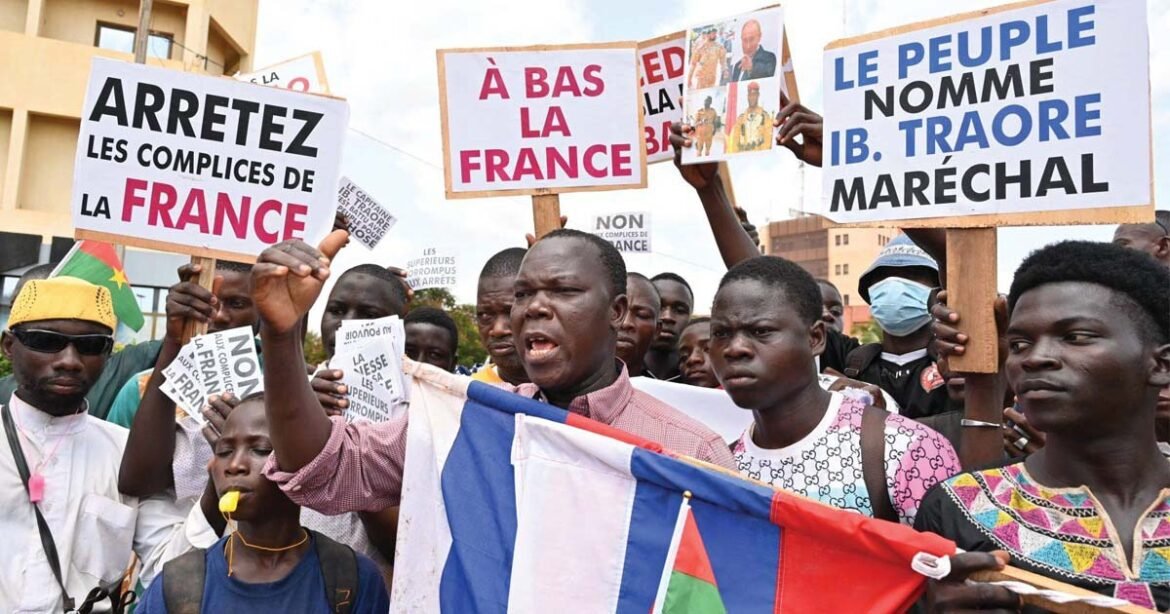France established defense agreements that frequently led to military interventions on behalf of unpopular pro-French leaders, thereby influencing political stability in the region
Niger has now joined the list of West African countries where the military has taken control, following in the footsteps of Burkina Faso, Guinea, Mali, and Chad, all of which were once French colonies. In recent times, 78% of the 27 coups in sub-Saharan Africa have taken place in Francophone nations, raising questions among analysts about the potential role of France or the enduring impact of French colonialism in these events.
What has exactly happened?
Since 2020, the West and Central Africa region has experienced its ninth military coup, with Niger being the latest country affected. Colonel Major Amadou Abdramane and a small group of troops made a bold declaration on national television, ending President Bazoum’s rule and disrupting the nation’s peace. The soldiers responded by sealing borders, suspending government institutions, and imposing a curfew due to the deteriorating security situation.
You can also read: Can Ukrainian grain find a global route through Croatian ports?
Identifying as the CNSP (National Council for the Safeguard of the Homeland), Major Abdramane and his men vowed to ensure President Bazoum’s safety while warning against external interference. The palace and nearby ministries were barricaded with military vehicles as President Bazoum resisted yielding control and meeting the coup plotters’ demands.
The exact cause of the uprising remains uncertain, though some observers speculate it may be linked to rising living costs, perceptions of government inefficiency, and corruption. Ulf Leassing, an analyst from the Konrad Adenauer Foundation, highlights that Niger’s apparent stability, driven by foreign aid, has concealed an underlying illusion, now exposed by these recent events.
In the past, global alliances have often favored the political elite over ordinary citizens. Reports indicate that troops from the Wagner group, allied with Putin’s government, were involved in torturing and massacring civilians in Mali during anti-insurgency operations.
While reducing French influence may not guarantee political stability, it could lead to a situation where new military leaders attempt to justify coups by aiming to counter malign Russian influence in their countries in the future.
Emerging anti-French sentiments
Certainly, many of the coup plotters seem to hold this belief. Colonel Abdoulaye Maiga, who assumed the role of prime minister after the military junta took over in Mali in September 2022, launched a scathing attack on France. He criticized France for its “neocolonialist, condescending, paternalist, and vengeful policies,” accusing the country of betraying universal moral values and betraying Mali.
Anti-French sentiments have also been on the rise in Burkina Faso, where the military government terminated a long-standing accord allowing French troops to operate in the country in February. France was given one month to withdraw its forces, leading to a strain in the relationship between the two nations.
In neighboring Niger, allegations surfaced that President Mohamed Bazoum was a puppet for French interests, which was used to justify his removal from power. Consequently, the military junta led by Gen Abdourahmane Tchiani revoked five military deals with France.
The historical context lends some credibility to these grievances. During French colonial rule, the political systems were designed to extract valuable resources while employing repressive tactics to maintain control. France’s continued involvement in the politics and economies of its former territories after independence set it apart from other colonial powers, like Britain. The legacy of French economic policy in its former colonies is evident in seven of the nine Francophone states in West Africa, where the CFA franc, pegged to the euro and guaranteed by France, is still in use as their currency.
Additionally, France established defense agreements that frequently led to military interventions on behalf of unpopular pro-French leaders, thereby influencing political stability in the region.
Niger’s fragile political landscape
Niger, a country with a colonial past, has grappled with persistent political instability since gaining independence in 1960. Over the years, it has experienced four successful coups and numerous failed attempts at seizing power, resulting in an uncertain environment that hinders progress and development. This instability has led to challenges in achieving prosperity, evident in its low ranking on the UN’s human development index. With a population of 22.4 million, the nation faces the additional burden of a high birthrate, averaging seven children per woman, contributing to its population growth.
Niger is facing an escalating threat from Islamist insurgencies, exacerbating the country’s existing problems. The nation is currently grappling with two major Islamist insurgencies: one originating in Mali in 2015 and affecting the south-west, and the other led by jihadists based in northeastern Nigeria, impacting the south-eastern regions. The involvement of Al-Qaeda and Islamic State-affiliated militant groups has further compounded the issue, posing a grave threat to Niger’s security and overall stability.
Françafrique and Neocolonial Ties
The strengthening of corrupt leaders like Idriss Déby and Blaise Compaoré posed challenges to democracy. Despite not militarily intervening to reinstate deposed leaders, France was perceived as favoring them. The corrupt relationship between French leaders and African allies enriched a powerful elite at the expense of citizens. François-Xavier Verschave coined “Françafrique” to describe this neocolonial relationship, marked by criminal activities and embezzlement.
Despite attempts to distance from it, problematic ties between France, French interests, and Africa persist, leading to discontent among some Africans. Scandals were overlooked when France’s African allies held power, with France’s military support contributing to stability.
In recent times, France and other Western states have faced increasing criticism due to their declining ability to maintain order effectively. Despite substantial resources, the French-led international response to Islamist insurgencies in the Sahel region has failed to assist West African governments in reclaiming control of their territories. This failure had significant implications for civilian leaders in Burkina Faso and Mali, as they were unable to protect their citizens, leading to the perception that French support became more of a burden than assistance.


